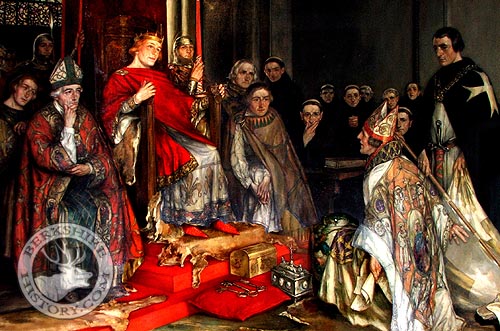 |
 |
|||
|
 Reading Abbey: Reading Abbey:Events under Henry II Visiting Archbishops & Patriarchs The best remembered event, from the reign of King Henry II, that occurred in Reading was the notable trial by combat that took place between two great knights on De Monfort or Fry’s Island in the middle of the Thames, near Caversham Bridge, in 1163. Only a year after this incident, another gathering took place at Reading. The occasion was the hallowing or consecration of the Abbey Church by the Archbishop of Canterbury, Thomas Becket. Once more King Henry II journeyed to Reading and, with him, a throng of warlike nobles. Because of the presence of the Archbishop, and because of the religious ceremony to be held, there came no fewer than ten bishops as well and a multitude of people. Surely on that April Sunday in 1164, there was a scene at Reading long to be remembered. With what eagerness must the visitors have beheld the new church in all the purity of its white stone; the processions of bishops, priests and monks; the gifts offered to the church; the solemn hallowing by the Archbishop. But chiefly men's eyes sought out Henry, the King, and Thomas, the Archbishop. Once these two had been as David and Jonathan. Alike in work and in pleasure, the son of Geoffrey of Anjou and the son of the Cheapside merchant had been as brothers together. Henry had not worn his crown long before he raised the witty and clever clerk, with pale dark features and bright eyes, to be his Chancellor; and now he had raised him higher still, to the Primacy of England. Yet all men knew that things were now not well with Henry and Thomas - that their old comradeship had turned to distrust and hate. Henry's stormy temper and masterful will were matched by Becket's proud resistance. On that day at Reading none indeed could foresee that the direful ending of this quarrel would be an Archbishop cruelly murdered and a King shamed; but the quarrel of two such antagonists must have set many talking and watching. Not one, save Becket alone, in all that throng of the great and powerful but stood in awe of the King. There sat Henry, twitching the short cape at which the long-robed courtiers mocked, and fidgeting with his coarse, restless hands. Truly he was no darling for silken bowers. Wind and rain and sun, and a thousand journeyings by land and sea, had roughened his cheeks. Much riding to and fro through his far-stretching dominions had bowed his legs. His bullet head was bristled with red hair, his frame thick-set and burly, his eyes glowed with dangerous fires. Good he was not. Gentle and gracious he was not. Yet such a man has his place in the World, and mighty indeed was this man's work. He broke men and kingdoms to his own far purposes; and, with blow upon blow, and lesson upon lesson, he taught undisciplined England the stern truth that, only by the path of law and order, could she attain to greatness. For mastery is won through discipline and obedience. In 1185, Henry II was again at Reading Abbey. He came to hear the petition of Heraclius, the Patriarch of Jerusalem. Christian peoples of Europe were, at this time, very eager to prevent the Holy Sepulchre at Jerusalem, and indeed the Holy Land itself, from falling into the hands of those who were the enemies of the Christian Faith. Heraclius came to Reading in order to beg the King to interest himself in the Third Crusade, which was then going forward. Heraclius spoke long and eloquently and he ended his appeal by placing, in the King's hands, the keys of the Holy Sepulchre and the Holy
City and offering him the Crown. He also brought gifts of holy relics of the Nativity, the Passion and the Resurrection of Christ. It is said that he moved the King and all who heard him to tears. But Henry was a cautious as well as a fiery ruler. The tears might run down his cheeks, but they did not mean that he would agree to anything rash or foolish. He was not at all eager to spend his money and strength in this costly and perilous enterprise. At last he gave this answer. If, said he, he were to go, as he was asked, to Jerusalem, it would, of course, mean that he must leave England and, moreover, leave it exposed to the attacks of its hostile neighbours. Now, he felt sure, he continued, that his own Kingdom of England was as pleasing to God and as devout as Jerusalem itself. It could not, therefore, be pleasing to God for him to abandon England to ruin, even for the sake of Jerusalem, and so he could not consent to the request of the Patriarch. Heraclius, therefore, went away disappointed. Two years later Jerusalem fell into the hands of Saladin, the leader of the infidels.
|
|||
| © Nash Ford Publishing 2017. All Rights Reserved. | ||||





